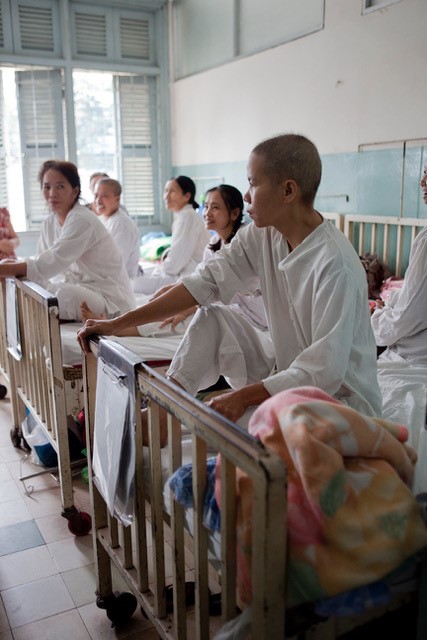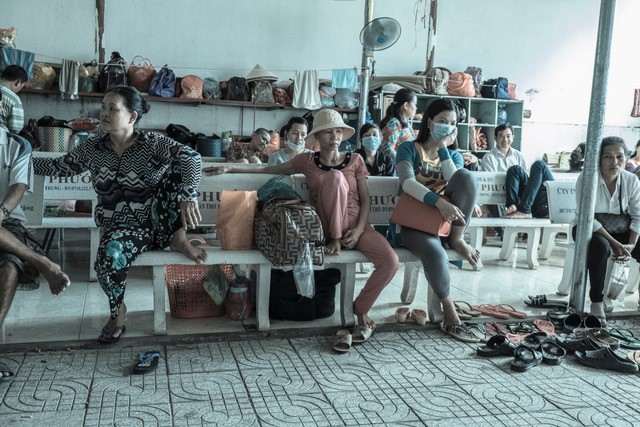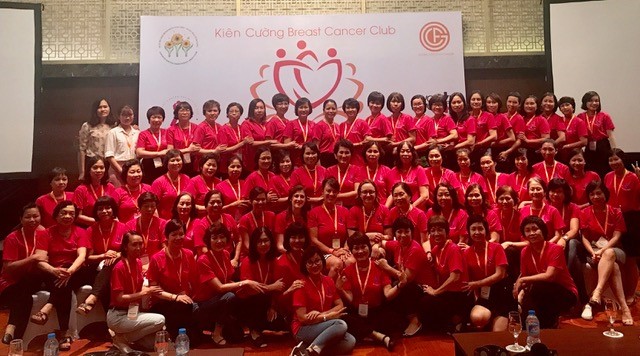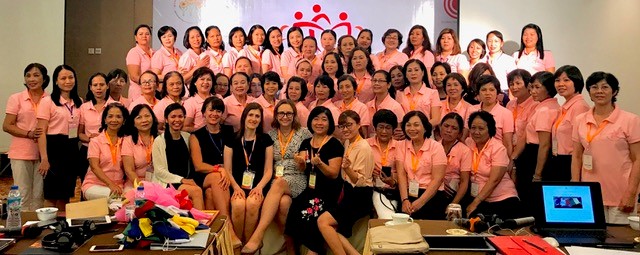By Carolyn Taylor and Dr. Don S. Dizon
As an oncologist, I have witnessed amazing transformations—not only in the way we treat cancer, but in some responses to it. I’ve met so many who greet the diagnosis with fear. They worry about what is to happen, and whether or not they will live to see another year—and a year later, they appear stronger than ever with a renewed sense of purpose, of what’s important to them, and a hunger to live. It’s not everyone, but I’ve seen it enough to know that people are changed after a diagnosis of cancer. My patients are often asking how they can get more involved in cancer research, or what role can they play in our center; these are expressions of gratitude, certainly, but even more, there seems to be a shared sense that there’s still so much more to do. To see people I’ve treated not only survive, but thrive after their initial diagnosis is gratifying. While I know some will have a relapse, at that point, they envision a future, and how they can change it. Most of my patients look to their local communities to make a difference, while others engage with national organizations doing great things—Young Survival Coalition, the American Cancer Society, and so many others.
However, a small proportion of those who’ve been through the diagnosis find their eyes trained more globally. One of them is my colleague, Carolyn Taylor. Carolyn is the founder and president of Global Focus on Cancer (GFC), a nonprofit organization whose mission is to act as an agent of simple and effective change to help reduce the global burden of cancer through programs in cancer awareness, advocacy, support, and networking in countries where access to information about cancer is critically lacking.
I met Carolyn through a mutual colleague, Dr. Julie Gralow, a mentor and a friend whose tireless work to address cancer disparities globally earned her the 2018 ASCO Humanitarian Award. I had sought her advice about getting more involved in international work in Asia and the Pacific, and during our conversation, a proverbial light bulb seemed to go off: “You should meet Carolyn Taylor.” Following an email, Carolyn and I were meeting for the first time at the 2019 ASCO Annual Meeting.
Carolyn is a global cancer care advocate and serves as a content expert with the Women’s Empowerment Cancer Advocacy Network. She is also a co-chair, organizer, and speaker for global cancer symposiums, sits on ASCO’s Gynecologic Cancer Guideline Advisory Group, and was a contributing author to the Lancet series “Health, Equity and Women’s Cancers.” In addition to her work with GFC, Carolyn is a professional photographer and cancer survivor who uses her talent and personal passion to share images that remind us that, regardless of race, religion, nationality or economic status, we are all one in the battle against cancer.
I remember meeting her for the first time, so curious to know how she embarked on this path. She told me:
“In 2006 at 43 years old, I was diagnosed with ovarian and endometrial cancers. I was fortunate to have been diagnosed at an early stage. In fact, I often joke that I only had cancer for 3 weeks. I knew how lucky I was and felt compelled to do something to help others. I was inspired by the global work of my gynecologic oncologist, Dr. Peter Dottino, and his wife, Dr. Ann Marie Beddoe, but what, as someone who makes their living as a food photographer, could I possibly do? About 2 years after my diagnosis, a random email from British Airways popped into my inbox; it was a contest offering 10 business class flights anywhere in the world. The contest required three essays describing how you would use this opportunity. In those essays, I spoke from my heart about wanting to use photography to document that no matter where we live, the color of our skin, or what God we believe in, we are all one in the battle against cancer. I was elated when I was notified I was one of the contest winners. Between March 2010 and March 2011, I logged more than 120,000 air miles visiting 14 countries, interviewing and photographing patients with cancer, survivors, caregivers, and medical professionals in an attempt to give a global face to cancer. Many of the low- and middle-income countries I visited bear the heaviest global cancer burden, with 70% to 80% of patients being diagnosed in late stages of their disease and up to 70% of these patients dying within 3 years of receiving their initial diagnosis, often leaving their families financially devastated. I saw patients and their families suffering from a tremendous lack of awareness and education about cancer, little to nonexistent support programs in place, and very few people addressing this. I thought, I could use my photography to shed light on this, or I could actually do something tangible. That is how I decided to create Global Focus on Cancer (GFC) in 2012.”
I found it incredible how she was able to marry her passion for photography and global advocacy, but I also wondered how she did it. I thought of my own career and how much I travel—the strain it places on my partner and my kids, and on my own clinical practice. Still, I had embraced the opportunity to teach as part of my calling in academic oncology, and I was fortunate to have the backing of my family to do what I do. To this, Carolyn responded:
“It’s a challenge. I spent 21 weeks out of the last year on the road. My husband joined me on two of the British Airways trips to East Africa and Southeast Asia, so he understands the tremendous difficulties patients with cancer face and supports my work. It also helps that we don’t have any children. My family and friends at home are all very supportive as well. But yes, it can be tough to shift gears when you come home, especially considering that I still work as a photographer to make a living (global cancer advocacy isn’t exactly lucrative). It’s hard not be judgmental of the challenges of everyday life in the U.S. after seeing the striking hardships people face in low-resource settings. I have to remind myself that these are very real in the context. It’s important to keep perspective and not climb onto my soapbox and preach about how lucky we are here (even though we are!). Also, there is a wonderful, albeit small, global community doing this work. We are a kind of family, tied together in the work and lifestyle, so that really helps as well. And of course, there are always cocktails.”
I imagined in her work that she had seen such remarkable scenes, met incredible people, heard so many stories. But I wondered if she had any that stuck out in her mind:
“I’ve met so many inspiring patients, clinicians, and advocates who motivate me. They are a constant reminder that cancer does not discriminate, but in a way unites us and reinforces just how alike we are and how small the world is. The biggest highlight for me is seeing real progress. We have concentrated our efforts in Southeast Asia, particularly in Vietnam. When we started working there 7 years ago, there was only one small, monthly breast cancer support group in Hanoi and no other supportive cancer services for the rest of the 96 million residents of Vietnam. Now, five of the main oncology centers around the country have some form(s) of support. We have introduced clinician-led support groups—bridging the knowledge gap between patient and provider, peer-to-peer support, which uses cancer survivors to assist new patients with psychosocial and navigational aid, and have recently built an educational video series designed to improve cancer health literacy for patients and their caregivers and empowering them to make the complex decisions required around a cancer diagnosis. It’s jumped from about 75 people a month receiving support to thousands of people each day. It’s both humbling and gratifying to see. Lastly, we could never have achieved what we have without our dedicated local partners. Even though they are extremely overburdened, they have been ardent in their commitment to work with us to develop these much-needed resources for their patients."

Above: Cervical Cancer Unit, Ho Chi Minh City Oncology Hospital, Vietnam.

Above: Typical ward, Ho Chi Minh City Oncology Hospital, Vietnam.

Above: Waiting/sleeping area for caregivers, Can Tho Oncology Hospital, Vietnam.
Something about her answer reminded me of why I went in to oncology. For me, I wanted to make a difference, but I have always thought about that in terms of a personal doctor–patient relationship. If I could make even one person’s life easier after a cancer diagnosis, really help them, then I thought that would be enough. Yet here Carolyn was trying to create systems-level changes halfway across the world, and in so doing, touching so many other lives. I wanted to know if she ever imagined she would be doing this work and how she maintains her passion:
"I live by this mantra: 'Are your good intentions the best intentions?' I come to this work as a photographer and cancer survivor, not a global cancer expert. I’ve had to educate myself in this arena, and after 9 years, I still have a long way to go. To fill gaps in my knowledge and expertise, I have been able to forge collaborative partnerships with experts in the field. Their advice and leadership have been critical to GFC’s success, and I am forever grateful for their generosity. I always try to remember that GFC is building these programs to serve the needs of the local community—this isn’t about me, so I do my best to keep my ego in check. Finally, I try to rejoice in the small successes because I know everything we do will undoubtedly take longer, and be much harder, than we originally thought it would. I am, however, certain of one thing: we will get there—we will make positive and lasting change. If someone said to me 13 years ago, 'You are going to have cancer, and it’s going to be the opportunity of a lifetime,' I would have told them they were crazy, but for me, it has been just that."
Part of my fortune has been meeting some incredible people. When I was younger, I thought these would be the academic leaders in oncology, whom, one day, I would be able to call by first name, and maybe—if I was lucky—be included among their ranks. Today I realize you don’t need an MD to make a difference or to be an agent for change. You can be inspired by a frightening diagnosis, and become that luminary in your own right.


Top and above: Training for survivors of breast and gynecologic cancers for GFC’s peer support program “Stronger Together” in Hanoi and Hue, Vietnam.

Above: 2015 Cancer Support Summit, DaNang, Vietnam.
Photos courtesy of Carolyn Taylor.


Recent posts